My entry in the Comedy Countdown, a video essay on Modern Times mixing and matching three iconic texts on the famous film, from Otis Ferguson, Roland Barthes, and Graham Greene. Enjoy!
in YouTube, in two parts (aspect ratio is distorted, Vimeo upload is superior)
Thanks a million to Jeff and Greg for making it happen, last-minute!
For further discussion, visit the comments under my cross-posting at Wonders in the Dark: The Comedy Countdown - Modern Times (a video essay)
Cross-posted at Wonders in the Dark; read the comments.
This is a Top Post. To see other highlights of The Dancing Image, visit the other Top Posts.


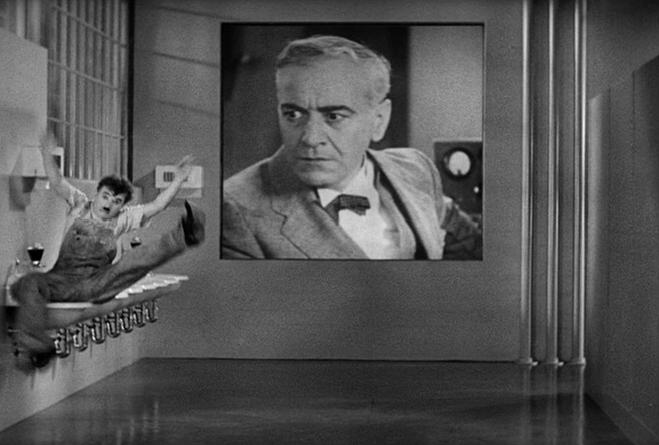
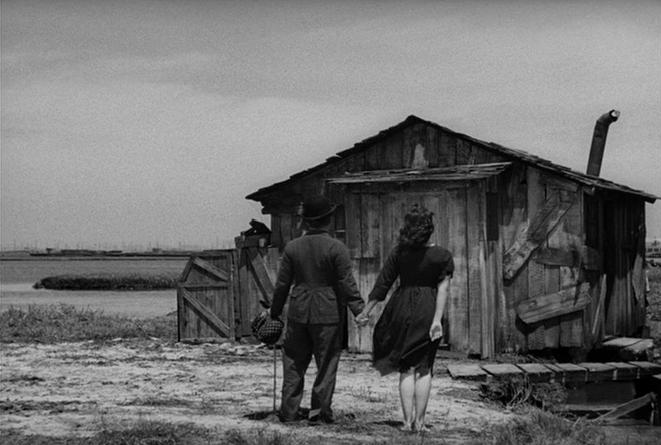
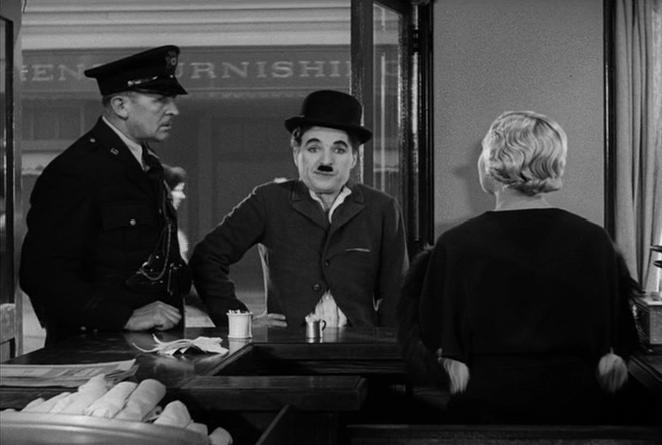
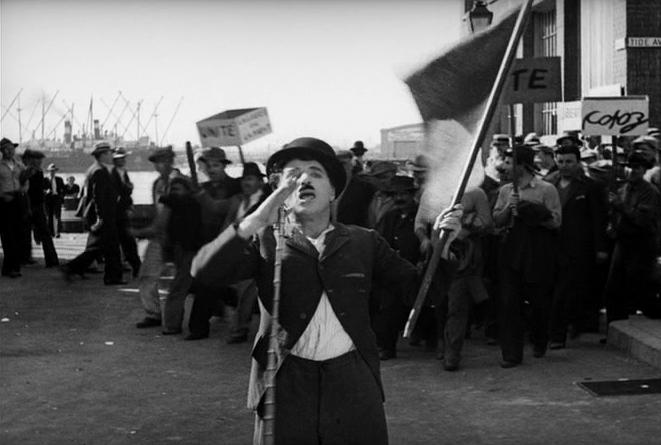
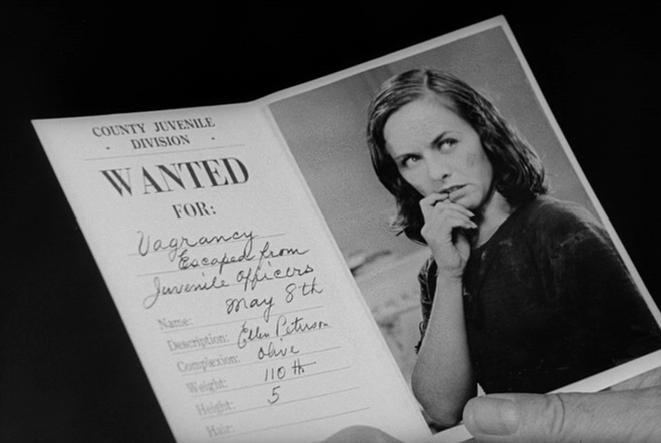
13 comments:
Great stuff. Modern Times is my favorite Chaplin thus far, it had the funniest gags and relavent subtext, some of which I didn't even realize before watching your wonderful video essay. Actually now I wanna re watch it. Alas, I'm off to Dogville, and will leave a comment of my thoughts on that post soon.
Yeah me too - I never really considered Modern Times one of my favorite Chaplins, but after reading those great essays and skimming through the film's visuals to create this project, I'm filled with a new fascination for it. I'll probably re watch it as soon as I get the chance.
I wonder what Barthes would have to say about Von Trier...
The Ferguson essay is excellent, better even than Greene's, but I'm fascinated that both of them (in contemporary reviews of the film, presumably), reject the idea that the film is political; OF says that "truth is that Chaplin is a comedian", as though it somehow discounts him from also being political, and GG pretty much says the same thing, with "artist" somehow substituting "comedian". Only Barthes perceives it as an explicitly political film (in a review that was probably written much after the film first opened, I think, but regardless), but I wonder if reviewers (not just the great ones) are reluctant to concede that films they enjoy, are political films; and that every film is, in fact, a political film.
Syriana was praised a political film when it was came out, but when I saw it a week back, much of it looked anything but political. I mean, I liked it okay, but still...
Great point, Shamus - and by the way, I owe the genesis of the idea at least in part to you, as you mentioned the Barthes essay back under my Gold Rush piece in August.
Overall, I think I align with Greene's overall sensibility the most (although it's coincidence that it was him I ended up voicing) - not as dismissive as Ferguson's, not as single-minded as Barthes'. And yet within the specific field of the film's political engagement I think Barthes is dead-on. While I wanted to let the pieces generally speak for themselves (usually choosing clips that illustrated, rather than contradicted the author's points), there were several times where I quite consciously arranged the order or juxtaposed the clips to subvert one or the other argument.
One of these occasions was the back-and-forth between Barthes, Ferguson, and Greene on the film's political context, where I wanted to give Barthes the final word and a bit of a rejoinder to the notion that the film is not political and has nothing coherent to say about society because it doesn't simply embrace Marxism. (Likewise, I wanted to close with Greene's romantic enchantment with the conclusion rather than Ferguson's rather condescending summary of the same finale, although I included that as well; though I'm offering a forum to these perspectives I'm also making editorial decisions which reflect my own point of view.)
I think you're right about this: "I wonder if reviewers (not just the great ones) are reluctant to concede that films they enjoy, are political films; and that every film is, in fact, a political film."
People seem afraid that to impose ideological readings on a movie will deaden it, a reservation somewhat understandable, but I think the key is to pursue political analysis as one thread, not necessarily the only, or exclusively important one (which is something Marxist and other left-wing cultural critics have done at times, which explains at last some of the resistance).
One of my surprises in blogging, especially because when I was just watching rather than writing about movies I considered myself more of a formalist (something that has gotten very little voice in 600+ posts, to my disappointment), is how often I feel inclined to hone in on the sociological readings of movies, what they say often very inadvertently not just about their makers but society and culture in general, they way the reflect or refract various attitudes and values.
Incidentally, I wrote a piece around the same time as that Gold Rush essay, which you might enjoy. It's long though (longest I ever wrote maybe) so worth taking in installments. I just came across it again while going through some old stuff, so it's on my mind:
http://thedancingimage.blogspot.com/2012/08/sixties-reunion-big-chill-return-of.html
Very much about how films reflect political/social/cultural contexts, often in different ways than they intend.
I agree it's very hard NOT to make a political film when all is said and done, and the intention to do otherwise will brand any study of modern life, even something like "Pretty Woman", political just by dodging the full ramifications of what the woman and the man in the picture do to get around their social barriers.
I just scrolled down the wonders in the dark page to see a lively discussion on there- I should have posted there, instead. But I'll modestly accept thanks for the genesis of the idea on the website I suggested it, ha.
I think you're being a little unfair to Ferguson: his essay is not condescending- appreciative but somewhat critical at the same time. His language is exquisite, though, even if you disagree with him at places. I already mentioned that Barthes' piece is one of my favorite pieces of film criticism (even if it is not about film proper- his essay on Garbo is incomprehensible), but I generally like those reviews that do not attempt to capture every aspect of the film, but microscopically examine one or two components that go into making the film- the observations on the minute details somehow throw light on the entire film (I think).
I liked your essay on the Nolan film quite a bit, Joel. It nicely examines the contradictions and lies that went into making the screenplay for the movie.
Doug Nokes, any film that pretends that there is no such thing as politics - or that it is possible to somehow transcend politics - is participating in a gigantic, lie. Unfortunately, most of the films from the movie factory-conglomerates, sell precisely this very lie to millions.
Oh I like Ferguson's review a lot and definitely see it as positive overall. But he is definitely raising an eyebrow at Chaplin's attachment to silent technique and conventions and I think his characterization of the ending is pretty clearly of the "it's good for this type of thing" variety. That he rather enjoys "this type of thing" doesn't quite shake off the sense of head-patting.
Btw, not sure if "the Nolan thing" was in reference to the August link, but actually that was to another piece I wrote grappling with politics in cinema: The Big Chill & Return of the Secaucus 7, although half the essay is about the evolution of the "boomer" and "sixties" concepts in mass media & culture - I used to think my essay was kind of rambling but I took another look at it recently and kind of liked it actually. Not that that doesn't mean it's still rambling haha...
Doug & Shamus, I think there are films were the emphasis is not on the political which is fine; what can get kind of grating is when a film embodies a political point of view (the Pretty Woman example you mention could probably apply to a lot of other films as well) while blithely pretending not to. I would say the majority of Hollywood films are very political in this manner; the "less political" films are probably small-scale human dramas more focused on individual ineraction than on the grand social dynamics and sweeping narrative voice that characterizes most "big" movies. Hope that makes sense.
And just to clarify but "small-scale human dramas" I don't mean something like Pretty Woman (which I actually haven't seen all of) with its fairy-tale atmosphere and eye-catching prostitution angle.
Of course it depends how you define "politics" anyway - probably a lot of the stuff that would eschew explicitly political content manages to have political implications regardless.
One thing I like about Barthes' essay is that it recognizes the insight of Chaplin's film regardless of what he "intended", which is what both Ferguson & Greene seem very hung up on. Maybe Chaplin wanted to be Brechtian, maybe he didn't. Either way, the insights of the film are not affected.
I find, actually, I'm most drawn to discuss politics in movies where the political perspective doesn't even seem to be entirely conscious. Maybe it's the detective work involved, or the fact that the unconscious is often more powerful (and revealing) than the conscious in politics as well as other fields of life.
Oh and Shamus (and others) feel free to comment on the Wonders thread as well. Conversations stay alive there for quite a while, and in terms of discussions I know of no other website that can hold a candle to it - I've had some of the most dialogues, debates, and sometimes flat-out arguments in my online OR offline experience on there.
"The film is political even if the filmmaker did not intend it to be so" is precisely why most, nearly all, films are political: they contain a code of unspoken ideas, pre-conceptions and suppositions that it assumes the (like-minded) audience would share- if you cast those implicit assumptions, the sub-text, into more explicit terms, then it becomes interesting. As Doug says above, sometimes what the film leaves unsaid is most revealing.
The Nolan thing is regarding your post in August, yes, but I didn't want to name the film.
Politics divides: this is one reason most reviewers (and many directors) would choose to ignore it instead. I think this may have come up in your Spielberg thread.
Ha, no I knew the Nolan film you meant! Just saying the link was actually to another piece.
Re: politics, I think that's particularly true of Hollywood films and less so of smallscale, more individual works. Every gesture, every expression the film industry makes is in some way dictated by its perception of what audiences want or expect, and those perceptions are VERY political. As a result, even most glib (prrhaps especially the most glib) Hollywood films are sociologically fascinating.
Dennis-- It does seem more interesting at times to go looking for the underlying layer of a political creed in a popular film than one that tries to hit a viewer in the face with its "message".
A movie like Polanski's "The Ghost Writer", to use one example, is loud and clear where it's going in condemning actions by powerful governments who claim to uphold decency and human rights. But at the end, the movies that try, as Shamus said, to pretend they aren't political are lying--and all the more intriguing when they are passed off as "pure entertainment".
Post a Comment